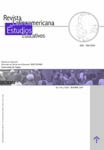Authors
Abstract
The Department of Human Development at the Universidad de Caldas, belonging to the Faculty of Law and Social Sciences, created during the second half of 2007, the elective course “Development of cognitive skills” as an area of human formation oriented towards cognitive and metacognitive training of students from different undergraduate programs. It also serves as an area for professor research, space in which it is expected to widen the understanding regarding the characteristics of cognitive functioning of students in the various cycles and levels of training, in order to confirm with arguments derived from educational research, some of the elements on how University students learn; and therefore, on how education could be directed, not only in the context of general and specific didactics for each discipline, but also in the search for a greater promotion of the students’ potentials, based on the optimization of their cognitive and metacognitive resources, as well as their brain power. These inquiries brought upon the research entitled: “Association between the course ‘Development of cognitive skills’ and the performance in some cognitive abilities of students in the basic cycle of undergraduate training at the Universidad de Caldas, 2008”. The objective of this study was to determine if the implementation of such courses, increased attention skills, memory, language and executive function of basic cycle students in undergraduate training. The results of said research led to the conclusion that there were no differences between the experimental and control groups, based on the training sessions of cognitive and metacognitive skills of attention and language abilities and the executive function for assessment in two moments: pretest and posttest. However, specific changes in memory skills were established. This article is derived from said research, which presents the memory characterization of the students who participated in this work, and its correlation with a measure of the general intelligence factor, since the technical literature reported a relation between intelligence and working memory. In this sense, it is considered that if in fact differences in intelligence depend on processing speed and the capacity of working memory, then attempts to improve intelligence from the educational point of view, should be directed towards the manipulation of the collapse points that individuals suffer due to the effect of the limitations that are evident in the ability of the working memory (Colom & Flórez-Mendoza, 2001).
References
Baddeley, A. (1999). Memoria humana. Teoria y práctica. España: McGraw-Hill.
Burin, D.; Drake, M. & Harris, P. (2007). Evaluación Neuropsicológica en adultos. Argentina: Paidós.
Bruning, R.; Schraw, G.; Ronning, R. & Norby M. (2005). Psicología cognitiva y de la instrucción. España: Pearson Prentice Hall.
Castelló, A. (2001). Inteligencias. Una integración multidisciplinaria. Barcelona: Masson.
Colom, R. & Flórez-Mendoza, C. (2001). “Inteligencia y Memoria de Trabajo: La Relación Entre Factor G, Complejidad Cognitiva y Capacidad de Procesamiento”. Revista Psicologia: Teoria e Pesquisa, Vol. 17, No. 1., pp. 047. España: Universidad Autónoma de Madrid.
Cosculleula, A.; Andrés, A. & Tous, J. (1992). Inteligencia y velocidad o eficiencia del procesamiento de información. Anuario de Psicologia, No. 52, pp. 67-77. España: Facultad de Psicologia, Universidad de Barcelona.
De Juan-Espinosa, M. (1997). Geografía de la Inteligencia humana. Las aptitudes cognitivas. Madrid: Pirámide.
Guma, E. & Alcaraz, V. (2001). Texto de Neurociencias cognitivas. México: Manuel Moderno.
Luria, A. R. (1974). El cerebro en acción. Barcelona: Martínez Roca.
Ministerio de Educación de Chile. (2006). Pisa 2006: Rendimientos de estudiantes de 15 años en las áreas de Ciencias, Lectura y Matemática. En: http://www.oei.es/evaluacioneducativa/PISA2006resumenejecutivo.pdf. [Consultado el 10 de julio del 2010].
Organization for economic co-operation and development. OECD. (s.f.). Programme for International Student Assessement (PISA). En: http://www.pisa.oecd.org/document/25/0,3343,en_32252351_32235731_39733465_1_1_1_1,00.html [Consultado el 10 de Julio del 2010].
Ostrosky, F; Ardila, A. & Rosselli, M. (1997). Evaluación Neuropsicológica Breve en español. Neuropsi. México: Editorial Universidad Autónoma de México.
Rosselli, M. & Ardila, A. (2007). Neuropsicología clínica. México: Manual Moderno.
Rosselli, M.; Ardila, A. & Puente, A. (1994). Neuropsychological Evaluation of the Spanish Speaker. New York: Plenum Press.
Rosselli, M.; Ardila, A.; Matute, E. & Ostrosky, F. (2004). “Desarrollo de las habilidades cognoscitivas en niños y niñas latinoamericanos con edades comprendidas entre los 5 y los 16 años”. Cuadernos de Línea. Grupo de Investigación en Desarrollo Infantil. Sublínea evaluación Neuropsicopedagógica. Manizales: Centro Editorial Universidad de Manizales.
Sternberg, R. (1989). Inteligencia Humana. Evolución y desarrollo de la inteligencia. España: Paidós. Tomo IV.
Téllez, A.; Téllez, H.; Mendoza, M.; Butcher, E.; Pacheco, C. & Tirado, H. (2002). Atención, aprendizaje y memoria. Aspectos psicobiológicos. México: Trillas.
Tulsky, D. & Zhu, J. (2005). Manual técnico. WAIS III. México: Manual Moderno.
Wechsler, D. (1945). “A Standarized memory scale for clinical use”. Journal of Psychology, No. 19, pp. 87-95.
Yuste, C. & García, N. (1998). Naipes G. Manual: Niveles elemental, medio y superior. España: TEA Editores.
Zapata, L.; De los Reyes, C.; Lewis, S. & Barceló, E. (2009). “Memoria de trabajo y rendimiento académico en estudiantes de primer semestre de una universidad de la ciudad de Barranquilla”. No. 23, enero-julio, pp. 66-82. Barranquilla: Psicología desde el Caribe, Universidad del Norte.

 PDF (Español)
PDF (Español)
 FLIP
FLIP



















